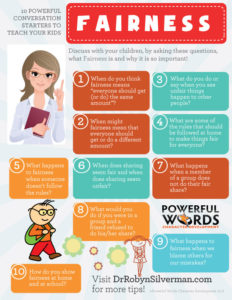Parents: How Do We Talk to Kids about Fairness?

Do you hear “that’s not fair!” a lot in your home or school? Many children believe that “fair” means “the same.” But often, “the same” is not fair at all. If you can imagine a bunch of different people, all with different needs, wants and interests- we’d never think that we should give them all exactly the same thing! Dividing up the pizza, time, help, snacks or privileges in equal-sized packages, quite simply, does not often make sense. Of course, other times, people should receive “the same” and that is, indeed, the most fair situation.
Fairness is the “Powerful Word of the Month” for Powerful Words this month and is also the topic for my US News & World Report article and infographics for October.
Ask your children what they think of fairness and come up with scenarios the illustrate when fairness means “the same” and when it means “different.” Here are some of the questions you can explore:
 (1) When does fairness mean “the same?”
(1) When does fairness mean “the same?”
(2) When does fair mean that everyone should get a “different” amount?
(3) What do yo9u do or say when you see unfair things happen to other people?
(4) What are some of the rules at home that ensures fairness?
(5) What happens to fairness when someone doesn’t follow the rules?
Also, explore some of these talking points I discuss in my US News & World Report article this month:
Talking point No. 1: Discuss people’s varying needs, since fairness is often based on what each person needs to be successful and healthy.
Talking point No. 2: Explain that fairness is sometimes based on desire and interest. Everyone likes different activities, foods, games, colors and books.
Talking point No. 3: Have a conversation about merit, hard work and perseverance. We want to send the message that people who put in the most time and effort often get the largest share.
Talking point No. 4: Talk about fairness and appropriateness. Let your child know that depending on a person’s age, experience and ability, what’s fair may change.
Talking point No. 5: Life, unfortunately, isn’t always fair.
In a quiet moment, talk about what you think is really unfair in life, whether it’s people who are suffering – like a friend who has lost her parent to cancer – or kids who are homeless, or it’s societal inequalities that make life difficult for certain groups of people. This will provide some perspective for your children, while you ask them to take a walk in another person’s shoes. They may even want to find ways to be able to help those in need!
I discuss these fairness talking points in Ask Dr. Robyn this month:
Come up on Facebook or Twitter and let’s discuss it!
Warm regards,





